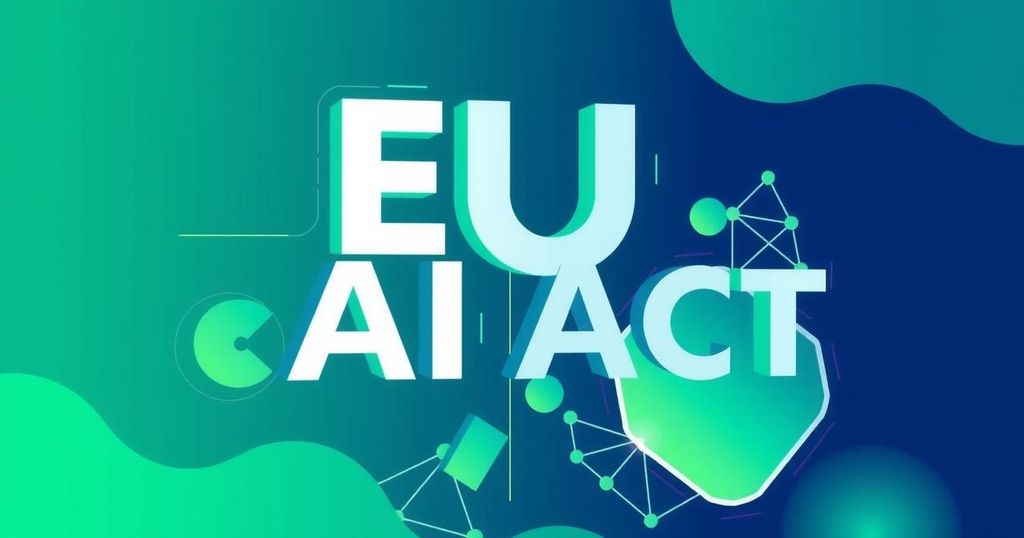EU AI Act: Pioneering Regulation for Artificial Intelligence in Europe
The EU AI Act introduces the world’s first comprehensive AI regulations, focusing on risk management and safety while promoting innovation. Different rules apply based on risk levels, prohibiting unacceptable AI applications. The Act encourages start-ups by providing testing environments and establishes compliance timelines to ensure an orderly rollout of its various provisions.
In a groundbreaking move, the European Union (EU) has unveiled the AI Act, marking a new era in the regulation of artificial intelligence. This legislation, which started taking shape with proposals in April 2021, aims to create a framework that safeguards citizens while still fostering innovation. By classifying AI applications based on risk, the Act strikes a balance between harnessing AI’s potential for good and addressing its inherent dangers.
The European Parliament, in crafting this legislation, emphasized safety, transparency, and ethical considerations. They stressed the importance of human oversight in AI deployment—essentially ensuring machines don’t make potentially harmful decisions without human intervention. Moreover, the legislation seeks a standardized and forward-thinking definition of AI, one that remains relevant as technology continues to evolve.
A key aspect of the AI Act is its tiered approach to risk. AI systems classified with unacceptable risks—those capable of, say, manipulating behavior or implementing social scoring—are banned outright. This includes dangerous applications like facial recognition technology in public spaces, with some allowances for law enforcement given severe criteria.
When it comes to high-risk AI systems, these are divided into two major areas. One group involves products that already fall under existing EU safety regulations—like cars or medical devices. The other group pertains to a variety of critical services, from education to law enforcement, requiring rigorous assessments before they hit the market and throughout their lifecycle. Citizens will also have avenues to voice concerns about these high-risk systems to national authorities.
Lesser-known but equally important are the transparency requirements placed on generative AI models, such as ChatGPT. While not classified as high-risk, these tools must better disclose their AI heritage, preventing illicit content generation, for example. Content that is altered or created by AI, whether it’s images or videos, will need clear labeling to maintain user awareness.
Aiming to stimulate the AI landscape in Europe, the Act also promotes an environment that nurtures start-ups and innovation. The legislation mandates that national authorities provide realistic testing conditions for AI developers, creating a supportive ecosystem for smaller companies to thrive in the competitive tech industry.
Implementation of the AI Act is expected to be closely monitored, with the European Parliament establishing a dedicated working group to ensure the rules are actively contributing to the digital economy. In partnership with the newly formed EU AI office, they’re tasked with clarifying key provisions and ensuring compliance.
As the timeline for this potentially historic law unfolds, we can expect a mixture of compliance timelines. By June 2024, the Act will be formally adopted, with provisions kicking in over the following years. Notably, the restrictions on high-risk systems will take effect in 2027, allowing for a gradual adjustment period.
In summary, the EU AI Act sets a new standard for global AI regulation, prioritizing safety while encouraging innovation. The road ahead will determine how effectively these principles are realized in practice, shaping not only European tech but perhaps influencing regulations worldwide.
The EU AI Act represents a significant regulatory step toward managing the complexities of artificial intelligence. By focusing on risk-based classifications and stringent safety provisions, it seeks to offer a secure technological environment. As we move towards implementation, balancing innovation with regulation will be crucial for fostering both ethical AI practices and a vibrant digital economy.
Original Source: www.europarl.europa.eu




